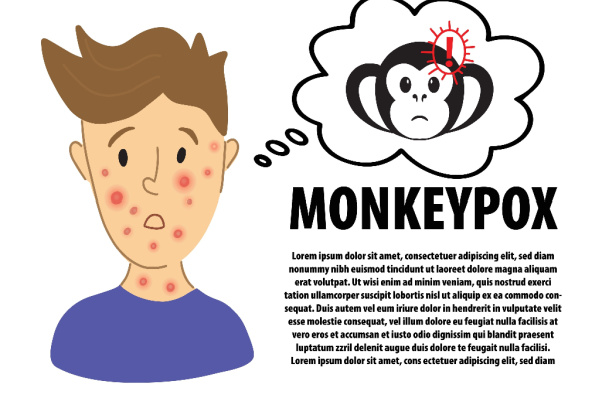The World Health Organization (WHO) is renaming monkeypox amid concerns that the name may be considered racist and might not accurately describe the origin of the virus.
WHO director general Tedros Adhanom Ghebreyesus said in mid-June that the organization would be renaming monkeypox. “WHO is also working with partners and experts from around the world on changing the name of #monkeypox virus, its clades and the disease it causes. We will make announcements about the new names as soon as possible,” he said, according to WHO.
This came on the heels of an effort by the scientific and medical communities to rename the disease. Earlier in June, a group of scientists wrote a joint statement urging for the monkeypox to be renamed, calling the current name “discriminatory and stigmatizing.”
“The prevailing perception in the international media and scientific literature is that [monkeypox virus] is endemic in people in some African countries. However, it is well established that nearly all [monkeypox virus] outbreaks in Africa prior to the 2022 outbreak, have been the result of spillover from animals to humans and only rarely have there been reports of sustained human-to-human transmissions,” they said.
“In the context of the current global outbreak, continued reference to, and nomenclature of this virus being African is not only inaccurate but is also discriminatory and stigmatizing. The most obvious manifestation of this is the use of photos of African patients to depict the pox lesions in mainstream media in the global north.”
“Words carry weight, words carry value,” said Dr. Perry N. Halkitis, an infectious disease epidemiologist and dean of the Rutgers School of Public Health, who lost many friends during the early years of the AIDS epidemic. “The problem with those kinds of terms is that they attribute blame, and when you attribute blame your create stigma, which emboldens hate and undermines the wellbeing of people.”
There are also concerns about whether the name of the virus accurately describes the origin of the monkeypox. The virus received its name because it was first found in monkey colonies in 1958, but the Centers for Disease Control and Prevention noted that the actual source of the virus is unclear.
That’s led some officials to warn people against targeting monkeys over the disease.
“What people need to know very clearly is the transmission we are seeing is happening between humans to humans. It’s close contact transmission. So the concern should be about where it’s transmitting in the human population, and what humans can do to protect themselves from getting it and transmitting it. They should certainly not be attacking any animals,” WHO spokesperson Margaret Harris said on Tuesday.
According to The New York Times, many scientists have already taken matters into their own hands and have begun using abbreviations such as “hMPXV” and “MPV” when writing or talking about the disease. There has been some progress in one aspect of the monkeypox nomenclature: A group of experts convened by the W.H.O. agreed to rename two monkeypox virus variants, or clades, replacing geographical references — Congo Basin clade and West African clade with Roman numerals (Clade I and Clade II).
Monkeypox is more than just a misnomer. Many experts say the word evokes racist stereotypes, reinforces offensive tropes about Africa as a perilous, pestilence-filled continent and abets the kind of stigmatization that can prevent people from seeking medical care. Stigmatization surrounding a disease, he added, can have other insidious repercussions: National governments, worried about the impacts on tourism or foreign investment, can conceal outbreaks within their borders. African exchange students living abroad can be shunned or ridiculed.
The naming of diseases has long been contentious and not just in Africa. In the first months after its emergence in China, the illness we call Covid-19 was unofficially dubbed “the Wuhan virus,” a designation that gained currency on social media before finding its way into the mainstream. What happened next was not entirely surprising: Violence against Asians surged in the United States and other countries. Business at Chinese restaurants evaporated. President Donald Trump repeatedly referred to the disease as “the China virus,” long after the W.H.O. had given the disease its current, banal-sounding moniker.
The virus naming process, established in 2015, seeks to “minimize unnecessary negative impact of disease names on trade, travel, tourism or animal welfare, and avoid causing offense to any cultural, social, national, regional, professional or ethnic groups,” the W.H.O. wrote at the time.
But these so-called best practices for naming new infectious diseases do not affect existing names that critics say have negative associations with actual places and people, like Rift Valley Fever, Middle East respiratory syndrome and Ebola, the hemorrhagic fever named for a river in Africa.
Changing existing virus names is another matter. The International Committee on Taxonomy of Viruses, which has a painstaking process for categorizing the multitude of known viruses, is responsible for assigning formal, scientific names. These are distinct from the common names of viruses.
Elliot J. Lefkowitz, a professor of microbiology and genetic bioinformatics at the University of Alabama at Birmingham and the organization’s data secretary, said it could likely take a year before the group’s members considered possible new names for the species into which monkeypox virus would be classified. Any new species name, he said, was likely to incorporate elements of the existing name to maintain a link with the past, a process separate from suggesting a new common name for the virus. “I don’t know of any virus name that’s actually been changed after it’s been used for years,” he said.
—
Photo Credit: Caelestiss / Shutterstock.com
